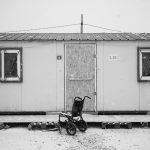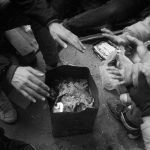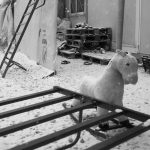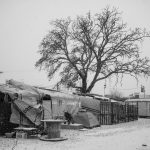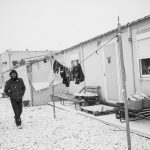Source: Infomobile w2eu
Following the closure of the Balkan-Route on March 2016 thousands of refugees who had been waiting for months in the tents in Idomeni were transferred and ‘parked’ in mass camps in northern Greece, in Greater Athens area and other parts of mainland Greece. Although they promised them better conditions than in the jungle of Idomeni or the informal tent camp in Piraeus Port, as well as quick legal transfers to other European countries, many of them still wait until today under devastating conditions. It is winter, and still hundreds live in tents or without heating while struggling with snow, heavy rains and strong winds. Most of them have some of their relatives waiting for them in other EU-countries and the other half remaining back home in war trying to survive. Meanwhile the EU tries to invest just as much in the improvements of refugees’ living conditions and asylum procedures in Greece as needed to re-establish Dublin returns to Greece as announced for 15. March 2017. It is the same infamous mass camps, which refugees are trying to survive now, where Europe seemingly plans to send Dublin returnees. A closer look shows the enormous tragedy resulting from this cynical plan to keep refugees stored at Europe’s inner borders unsafe, under devastating conditions and far from their relatives.
Imprisoned in camps that are located in abandoned industrial sites and military camps, forced to live far from local society, exposed to inadequate and undignified housing and harsh weather conditions, the currently 62.000 refugees living in Greece escaped war and conflict, hunger and poverty in order to end up in Europe without safety and without dignity, without sufficient food, without heating, without any hope to find a job and create a new life. They got stuck in limbo when the Balkan corridor was closed in March 8th 2016 and mainstream politics were transformed back from a short upsurge of a “welcome” trend to the old “closed borders” attitude confronted with the massive militarization of borders. In the Hot Spots on the islands of the Aegean and the mass camps on the mainland, these refugees since early 2016 get managed by the army, government officials, the UNHCR and international NGOs as a faceless mass identified by a number on a tent or a container and sorted by nationalities, and into the groups of ‘deportable’ and ‘non-deportable’, ‘undocumented’ and ‘documented’.
Refugees in the overcrowded hotspots in Lesbos, Samos and Chios island, in the mainland camps in Schisto, in Vagiohori, in Elliniko, in Oraiokastro, in Softex and in many places more since more than 10 months and until today stay in tents outside and inside cold industrial buildings. In camps that have only recently replaced the tents with containers, often there is yet no electricity secured, no heating available, doors and windows do not adequately protect from the strong cold winds of these days, from snowfalls and rain. Water pipes and taps are frozen, people hide under blankets to protect themselves from frostbites while their tents are standing in puddles and covered with snow. Most of the refugees have nothing else in mind than to escape from this hopeless situation in a country suffering since years from an enormous financial crisis and the mismanagement of the biggest refugee’s crisis since World War II. They risk their lives hiding on trucks to go clandestinely on a ferry to Italy. They hazard the consequences of trying to cross into FYROM and move on to Serbia and Hungary, even though they know about systematic ill-treatments by law enforcement officers and the Mafia as well as the risk to be detained and pushed back to Greece.
Lately, the United Nations Refugee Agency and the EU aid department have been accused by other aid groups of mismanaging a multimillion-pound fund. Paradoxically, UNHCR itself had emphasized only in the beginning of last December that some refugee hosting emergency sites are still in a poor state and lack basic services such as psychosocial counseling, health care and interpretation, or even proper security. Improving living conditions for asylum-seekers and migrants continues to be the number one priority for humanitarian actors in Greece, so UNHCR.
While the ‘winterization’ of refugee camps throughout Greece has been a main topic in hundreds of working meetings of the UN and the government ever since, today refugees still try to survive the cold and the snow in tents and without heating in many parts of Greece. The Head of Medicines Sans Frontiers in Greece said recently, that specifically the conditions for refugees on the islands of the Aegean are ‘regrettable and infuriating’ and warned the UN refugee agency and the Greek government of the implications a lack in coordination had. As he said, it massively affects the health of refugees.
The Greek government was discussing a partial transfer of refugees from the islands to the mainland again and again as overcrowding in the Hot Spots turned to be a major obstacle, but it was not able to stand up to the EU, which opposed this idea in fear to endanger the EU-Turkey Deal with such an action. Only very few highly vulnerable asylum seekers and some Dublin family reunification cases got the permit to leave actually during the following months. With the growing cold in the beginning of January UNHCR reiterated its call to accelerate the moving of asylum-seekers from the Aegean islands to the Greek mainland. Today, still nothing has been done to move greater parts of the islands refugees to more adequate accommodation facilities at the mainland, while Amnesty International is now collecting signatures to demand from the European Commission the immediate transfer of refugees to the mainland. “Asylum-seekers on the Greek islands face overcrowding, freezing temperatures, lack of hot water, violence and hate-motivated attacks,” Iverna McGowan, director of Amnesty International’s European Institution’s Office, had said in a statement already dating back to the beginning of December.
Despite, numerous witness accounts by refugees and solidarity people reporting of devastating conditions in the 36 refugee camps overall Greece, Greek Migration Policy Minister Yiannis Mouzalas reported on beginning of January: “There are no refugees or migrants living in the cold anymore. We successfully completed the procedures for overwintering.” As he said, the exception were 40 tents left in Vagiohori, near Thessaloniki, and another 100 in Elliniko Camp in Athens.
Even though only 24,692 remain in the camps run by Greek military, yet the government and the big NGOs active there fail to offer the needed support and infrastructure. Numbers of refugees in the camps decline successively as many depart by themselves towards FYROM and Serbia, and many others attend ‘voluntary return’ programs run by IOM preferring to be home in war, than suffering in the European camps. Squatting projects for opening homes to refugees, local solidarity groups and independent international and national helpers try to cover up for the huge lack in resources and the slow implementation rhythms of the bigger organizations. They are the ones make getting the vulnerables out of the tents in homes in the crucial moments, they care for immediate medical aid, food and warm clothes or heating solutions when all others fail.
Reacting to the never-ending criticism, Mouzalas announced recently once again that the government wants to improve the conditions in the camps. Furthermore, refugees who live legally in Greece shall receive an electronic card that will replace their residence permits and from March on refugees are to receive monetary aid instead of soup kitchen food in the camps. This financial assistance will be for symbolic reasons exactly one Euro bellow the minimum wage of 400 Euros, as the Minister underlined in an interview. The government plans also to hire more staff to deal with the slow pace of processing asylum requests.
Meanwhile, until today in the Hot Spot in Moria (Lesbos) hundreds of the more than 5,000 refugees staying there are still sleeping in summer type tents, although it has snowed. The government plans to finally remove refugees from the islands in April. For the moment a navy ship was sent to the port of Mytilene in order to host 500 refugees and protect them from the harsh weather conditions. Not surprising, many hesitated to enter the ship as they fear to be deported to Turkey and only 50 persons entered the vessel in the first days.
https://youtu.be/AeLGRdSW6xs
The question is what has really changed in Moria Hot Spot in comparison to October 2015, when during 4 days of heavy rainfalls refugees were unprotected from the harsh weather conditions too?
While the Greek government has been regularly accused for not managing the refugee crisis, it has been left alone by Europe with thousands of refugees from war torn Syria, Afghanistan, Iraq, Palestine, Somalia, Sudan and Eritrea amongst others. Europe is obviously investing money and expertise, to keep refugees out of their own doorsteps and to hold the infamous Dublin Regulation alive not matter what the cost. Even the relocation scheme agreed in late 2015 that was advertised heavily as part of the European solution remains unsuccessful as until the beginning of January only 7,760 asylum seekers had left Greece or were scheduled to leave. This represents only 12 per cent of the 66,400 agreed last year. More than that, from 700 unaccompanied minors who have the right for immediately relocation, just 200 have been relocated to other countries, according to Deputy Migration Minister Mouzalas.
Organizations like the Red Cross had already in autumn called upon the EU to relocate the refugees from Greece more rapidly. But the other EU Member States are seemingly not to let refugees even enter their own territory. Some of them have not taken in any asylum seeker from Greece or Italy, or accepted just very low numbers like for example Slovakia or the Czech Republic. Other countries like for example Estonia decided to not accept refugees that already have been accepted for the relocation program. This is the case of three women from Eritrea, which we met in the cellar of an abandoned building in the center of Thessaloniki seeking protection in a small tent. Lacking any other solution they decided to move on from Greece undocumented. After the rejection of Estonia, Praksis, the organization who was hosting them- a big NGO in Greece with a lot of funds- reportedly kicked them out as they did not belong anymore to the target group of “relocation applicants”. The women now try with the help of smugglers to survive the fences, ill-treating law enforcement forces and local mafia and reach Northern Europe by themselves. “What else should we do?”, they ask exhausted. They are hungry and afraid. In the abandoned building are also single men. “Last night one of them drunk and he attacked us. We are very afraid.” They have no choice than to try again, through the fields and the mountains to reach a safe place. Their biggest fear is to get stuck in Serbia like thousand other refugees who tried to escape from Greece the last months.
One hour driving distance away from Thessaloniki outside the tent camp Vagiohori we met, W. a Syrian father who also tried to cross to FYROM, Serbia and Hungary to reach finally Germany where his underage son and his mother live, but he has been arrested from the police near the Serbian-Hungarian border and was pushed back first to FYROM and then back to Greece. On his head he has fixed a head-light in order to find his way through the tent camp. In the camp there is no heating, no warm water, he explains. He didn’t take a shower for many days. The residents try to warm themselves at night near the only heater, which they received from volunteers. The Syrian man is extremely stressed.
In Germany are my sick mother and my 12 years old son. He is a child. He needs me. I have to find a way to go there.
His interview in the asylum office was in the beginning of January but he doesn’t know when his request for family reunification will be accepted and when he will see his son again. “I had my original registration date recently. It was just one day before the appointment that I got pushed back to Greece. I told the police officer to let me go so I could reach the Asylum Service the next day. He just kept me detained until the evening of the next day and I lost my appointment. Then he let me go.” His wife and his other three children are still in Syria. Somebody in the camp stole his mobile phone and he ever since lost contact with his family. He asks desperately if there is any opportunity for jobs in Greece. “I am willing to go to any part of the country and to make whatever job I find”, W. says.
He is not the only one with relatives in Germany in this camp by the end of December. There is also an Afghan family, with two underage children one of which is autistic and both parents are sick. They have all their other children in Germany. For three months they lived in the unheated tents, surrounded only by fences and trees. “We tried to go to Macedonia (FYROM), but my wife cannot walk that far,” the old man says. “We tried several times but we got arrested and sent back. In the nights we light small fires to warm ourselves. Then we go early to sleep. We close the tarpaulin and hide ourselves under many blankets.”
The camp with an official capacity for 631 persons, that hosted lastly mainly Pakistani, Afghan, Syrian and Iranian refugees. It is located near a solitary countryside highway. The military guards them. “It is one of the infamous camps in Northern Greece,” says a very experienced NGO worker. For a long period all “bad guys” from the other camps were transferred there. Now most refugees have left or were transferred elsewhere, as the camp was supposed to get closed. But also A. (16) from Syria, his small cousin and his uncle belong to the last group of residents. “I have my brother in Berlin,” he says, while he is holding a hot-water bag that he plans to bring in one of the tents inside the camp after our chat. The wind blows over the plastic of the tents. It is dark. Most people have hidden themselves inside the tents and under a couple of blankets. Only in one row of tents just near the fence a dozen of men sit around a fire keeping it alive.
The village Vagiohori has 60 residents, only a few more than the 55 refugees who were until recently living in the tents of the camp. There is no supermarket and no kiosk. When first refugees got transferred in the camp consisting of 90 tents (each sized for up to 7 persons) in beginning of May 2016 during the raid in Idomeni, and they were accompanied by heavy police forces as local residents reported, most denied exiting the busses. Even one person put fire on himself to protest the transfer. The next shop is 5km walking distance away. Despite original plans to close down this camp, now the government has announced to renovate it and keep it open as reception site for the undocumented.
Among the last residents there were a few families with kids, handicapped, elderly and sick. Finally, all residents got moved to hotels by mid January. It remains to be seen what will happen with the camp in future.
According to Greek media until spring new camps will open and others will be renovated or closed in Northern Greece. They are being categorized now by the “type” of legal status the residents are holding and their vulnerability: The “undocumented for first registration”, “the vulnerables”, “families”, “Yezidi”… Some of the camps will be hold on “pause” other will be of “temporary” character, adjectives that give an impression that they might be aimed for something else, something new, something like Dublin returnees maybe?
In another camp near Thessaloniki, in the village of Lagadikia we meet R., a single mother with her two small children. She lived in a small tent almost 10 months. Four months in Idomeni, waiting for the border to open and six months in a tent in this camp waiting for her relocation process to begin. She had to fight with rats and snakes, she said. Only in the middle of December the tents got finally replaced by 60 heated prefab units. But still she doesn’t feel safe there as she is a single mother alone.
We are so tired. We must finally arrive at a safe place.
First she waited in Idomeni for the border to re-open, then she could not enter the asylum procedure as the only access was Skype and that was permanently blocked. Then the government conducted the “pre-registration excersize” and she received a registration date in March 2017 only. The whole asylum procedure in Greece is too slow. Mostly Syrian, Iraqi and Afghan refugees are hindered from moving on and joining their relatives while merely surviving the Greek camps at the rims of local society. There are refugees who will wait for their asylum procedure to start until spring 2017. The Greek government estimated that some procedures will last up to three years. A prioritizing of the vulnerables among all applicants remained theory.
According to experts more than 60% of the approximately 7,500 refugees in Northern Greece have the right for family reunification. But the late registration of the request creates severe delays. Also very vulnerable persons have to wait. Like F., another women from Syria who waits with her small baby and her 11 year old son in Lagadikia camp, which can host up to 660 persons according to governmental sources but has currently only about 300 residents in 60 prefab units. The camp was opened in April 2016 and aimed to host relocation applicants, but there is a 20% of them who have applied for family reunification.

F. has health problems. Her baby was born on the escape route. Meanwhile her husband is a recognized refugee in Germany. “He has a German passport. Why do I have to wait 10 months in order to go to him? My heart is dead I don’t feel nothing anymore because we saw so many bad things in Idomeni.” She stayed with her newborn baby in a tent near Idomeni for four months in hope to finally arrive in the arms of her husband who by that time had never seen their baby before. A few days earlier he finally could come to visit her and the children for the first time since they got separated. In the nights F. cannot sleep. She is thinking and thinking. Her mind is also occupied by her worries of the wellbeing of her family in Aleppo. “They have no electricity, no water. No wifi. I haven’t spoken with them since one week. I am afraid for their lives,” she says and cries. Hundreds of other Syrian refugees who live in the camps in North Greece have the same thoughts for the relatives they left behind. Recently some of them marched during a protest to the Russian embassy in order to raise awareness about the situation of their families and friends who remained back in war.
Afghan refugees are also watching with concern the developments in Europe and at home. Outside the camp of Diavata we meet a group of men with their families. “I now know people who got deported and really their lives were in danger.” said a man from Afghanistan while talking about the recent deportation of refugees from Germany to Afghanistan. The city he comes from is in the hands of the Taliban, he explained.
There are many here in the camp, who lost their husbands, they lost their sons on the way… they suffered all this tragedy. How should they go back? With what dignity? Where should they go? They have a life? No. They have a place? No. I hope that the Afghans get some help in this misery. Really, If Europe has a heart for them, they shouldn’t leave them in this misery.
In the camp he faced the discrimination between different nationalities. The organisations were prioritizing Syrians with their aid. Still M. thinks, the refugees among themselves were co-operating well. But he is very frustrated by the two-class system in humanitarian aid.
Beside him soon appeared his daughter with her 12-year-old friend from Afghanistan. The underage brother of the girl lives in Belgium. Together with her mother and smaller siblings they wait since months for the family reunification. Specifically the period they lived in a tent, until only three days ago, they were staying under life-threatening conditions, the girl explains. The mood in the camp is extremely tense. Once, she said, their tent was lit on fire during one of the protests. Her siblings had to be saved out of it. Another time the girl got beaten and had to go to the hospital for weeks. Only two days she is living in a container house now.
Before we were in the tent, we were never safe. We were unprotected, always very anxious and my mother could not sleep at night. We only registered our family reunification claim a few days ago. First we applied for family reunification with my grandmother. But it didn’t work. Then my brother arrived in Belgium. Now we applied to go to him”, she says.
In late December the last persons, mostly Afghans, were able to move in one of the 120 prefab houses. “I have two kids, 5 and 6 years old. It is hard for children in the camps. Everything stays in their thoughts. Really, if we had known how hard it is here in Europe, how we slowly die, we would have better had our head cut off by Deash at once. If you live in these camps you shiver from night to morning due to stress, fear and cold. Our pain is endless. Now there are a little better days. Many refugees left. We are maybe 360 now. Before there were 3,000. You cannot imagine how it was. There were fights when queing for food. You saw people running this way, others that way. You couldn’t hold your plate. Then you saw someone bleeding. There was so much fighting. Now it is more calm, but there is nothing for us here. There are only containers, dust, a fence, the street. Nothing around, nothing to know, nothing to wait for.
According to official data across Greece there are 21,000 refugee and migrant children. Among them are also 2,300 unaccompanied minors while there are only 1,256 housing places available in specialized shelters. Meanwhile, 1,443 unaccompanied minors are on the waiting list for a shelter currently and 309 of them wait in detention in Hot Spots on the islands while 15 are in so called “protective custody” detained in police stations all over Greece.
M. (18) was one of them. He got arrested near Idomeni and detained for three months in Paranesti pre-removal centre near Drama while he was yet a minor. He only could manage to apply for family reunification before turning 18 by the help of an activist lawyer. Otherwise he would have lost his chance to move on legally to Germany where his brother lives. Ever since he got free and turned 18 he lives in Softex Camp, another infamous emergency reception site. Located in Kordelio, Thessaloniki, Softex Camp is currently hosting 950 persons while aimed to fit 1,600. Most of the tents outside have been replaced by prefab units, but inside the wharehouse there are still tents. It was where the last standing refugees from Idomeni got transferred and got famous for the reportedly worst residents among the Northern Greek Camps. Currently, temperatures are down to -10°C with strong winds and snow while refugees are living in a cold and dark warehouse or in partly broken prefab units, some of them even without heating. Also there is no water because of frozen pipes.
M.’s request for family reunification got accepted but he is waiting since many weeks for his ticket. “I am going crazy here. My family is back in Syria. My mother, my father. I am really going crazy here,” he repeats. The young boy is suffering from the worries about his parents whom he left back in war. He doesn’t know how to deal with the situation of being safe, while they aren’t. Of being under devastating conditions although he arrived in Europe, the place he imagined to offer him refuge. In his room, he tries to fight back the cold with an electric cooking unit, which he has provisory opened and uses as a heater. “I can’t stay here anymore. I have to leave. I cannot stay here anymore,” he repeats almost hypnotically while smoking one cigarette after the other. “I have suffered a lot here in Greece,” he says, “three months prison for nothing because I was underage! And now this…”
A few kilometers far from him only, is Oraiokastro Camp. The huge warehouse is filled with hundreds of green tents. In the beginning more than 20 tents were located additionally outside, being exposed to harsh weather conditions. But the numbers of residents has decreased over the months as in most of the camps on the mainland. According to UNHCR, the camp was opened on 28 April 2016. It has in total 320 tents and 58 toilets for currently 698 people (as of 11.1.17). The maximal capacity according to government sources reaches 1,500 persons and was exceeded in May and July. Most of the residents are refugees from war torn Syria.
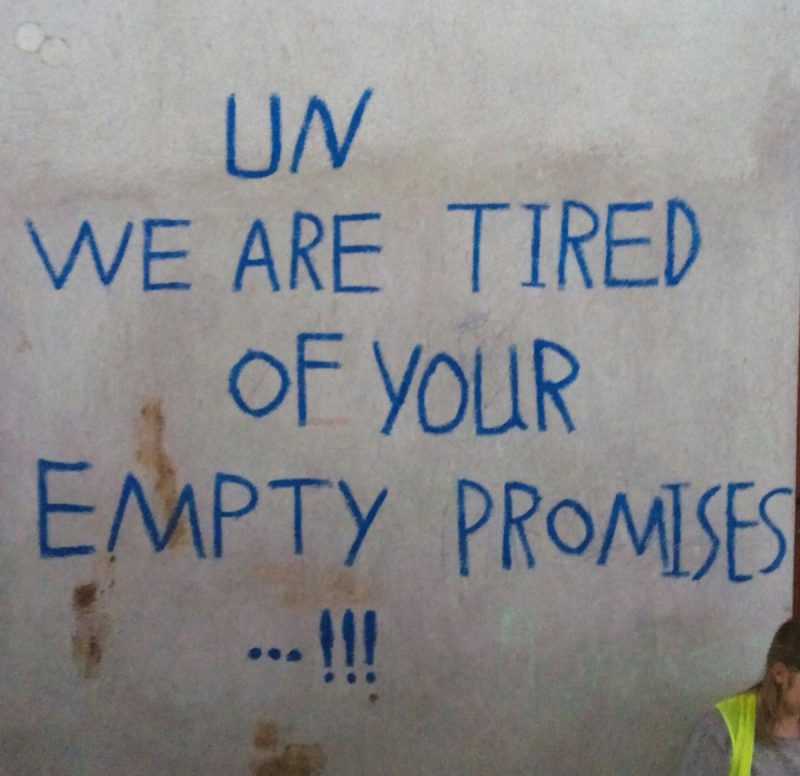
Oraiokastro Camp
This is where A. stayed until recently with his pregnant wife who was in advanced labor. They left the camp with the help of activists shortly before she was going into labour in December. Also his sick mother and his handicapped sister were staying there with them. “We were at least ten families with pregnant women living next to each other in unheated tents. All proper families were not daring to move out of their tents. There were many fights. We were afraid. There is no security.”
We had no electricity. No water. Toilets and showers were very dirty. It was cold. We suffered from the high tension among all residents, but we tried to stay strong. If you see this life there you get crazy. Eat, sleep, wake up. Oraiokastro is more difficult than Idomeni was. Many person there were bad, too. They were telling us what to do. Like a Mafia. Every good persons stayed all the time inside the tent to be a little safe. Especially woman. And you can’t do anything to change your life. You are standing helpless inbetween dirty cold tents. There are many families who have big problems, but you cannot see them because they won’t go outside of their tents. Our neighbours had a child who was four years old. They always cry, because they cannot take the child outside. It’s like a prison. I was the one who had to be strong for the whole family, because if you are not strong you don’t have nothing, you don’t get anything and no help.” So the strong man said and started crying.
Camp Oraiokastro was set up inside a former tobacco fabric. It is located near a national road, and refugees have repeatedly complained that cars often increase speed when they drive by the entrance where people, among them also many children, enter or exit. On October 16th a mother and her 9-year-old son child when hit by a car and died consequently. Her 12-year-old daughter got injured but survived. Refugee started protests shortly after the incident. As Moving Europe reported M., a member of the self-organised council of refugees in the camp which first came together at 27th of July, expressed his grieve and anger: “We asked the authorities to put speed limit and caution signs on the street in front of the camp. Why didn’t they do anything? People have to die before they do anything!” Only two weeks later, in November 2nd, a Syrian mother and her two kids got injured when their tent took fire. A makeshift connection to the grid caused the accident through an unauthorized electrical wire which refugees laid to get electricity and be able to use electric heaters.
The Camp got famous due to the many protests and street blockades with the residents demanding their rights and protesting against the inhuman conditions. It the appeared again in the media in September 2016 when, the parents’ association of two schools in the town of Oraiokastro threatened to occupy the school grounds in protest if refugees from the nearby state-run emergency reception site were allowed to join classes. Until today the atmosphere in the camp is tense, with refugees still suffering almost the same bad conditions as many months before.
The Nea Kavala Camp was one of the first to open and one of the biggest with a capacity for 4.200 persons. Already before Idomeni was raided, refugees transferred to the camp were regularly protesting. They held hunger strikes and made street blockades.
Recently, 174 prefab houses were placed there accommodating 920 persons (as of November). The camp was aimed to host those refugees who were waiting in Idomeni for the opening of the border and for this it was opened already in February 2016. Still after the disappearance of the tents there are many problems with the heating and electricity while water pipes recently froze, as refugees and activists report. Among the 1,050 refugees staying there currently, are mainly Syrians and Iraqis. Volunteers are trying hard to take out vulnerables into private homes to protect them from the cold winds that blow through the open fields.
A. sits often outside her prefab-house to warm her fingers at a fireplace, she tells. The heating is not functioning well. “I feel like paralyzed. The house is better than the tent I stayed in before, but what is the sense of waiting here so long? They have stored us like objects. We have nothing to do. But we are human beings with senses and feelings. Just like you.” She has her underage son in Germany. As soon as she mentions him she cries. She points to the camp behind her and even though looking very tired she seems to have the strong will to survive also this enduring hardship. But staying strong gnaws at her last will-power every day. She squeezes our hands and her eyes look at us intense, when she is asking:
“When?” is her only question. “When will I finally go from here?”
- NO ONE IS ILLEGAL!
- Freedom of movement for all!
- Open houses! Close the camps!
- Smash the borders!



